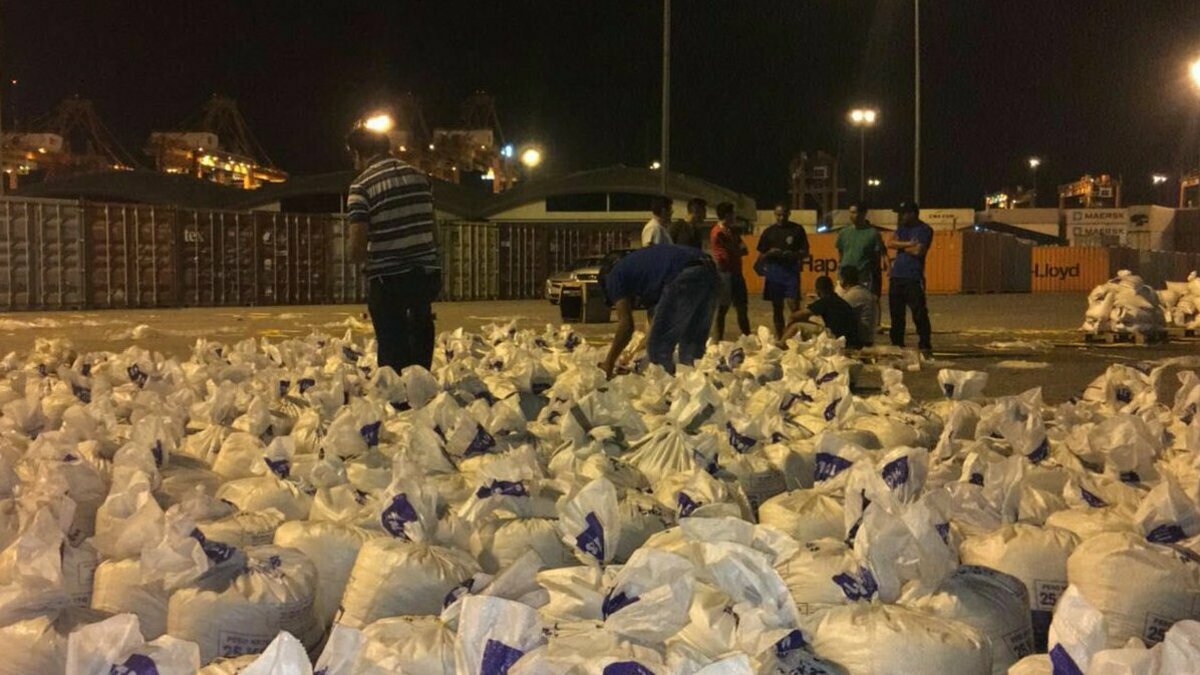Posted 17 августа 2023, 16:29
Published 17 августа 2023, 16:29
Modified 18 августа 2023, 07:47
Updated 18 августа 2023, 07:47

A wonderful vision. In the case of half a ton of cocaine, there is only one cocaine left, no implicated persons were found
What was the outcome of the trial on the supply of 472 kilograms of Ecuadorian cocaine to Petersburg
Julia Suntsova
The Moscow City Court released all five defendants in the case of smuggling more than 427 kilograms of cocaine in the courtroom.
Briquettes with the drug have been arriving in several batches on commercial ships from Ecuador to the port of St. Petersburg for six years.
Since 2019, there has been a trial: two Lithuanian citizens, Ernestas Kazlauskas and Mindaugas Koretsas, and two Russian citizens, Georgy and Ivan Radomirov, were tried for this crime.
The fifth defendant, Lithuanian citizen Igoris Grigas, was found guilty only of illegally crossing the border, while dropping drug charges. He was sentenced to 5.5 years in a penal colony, but he was also released in the courtroom because he actually served time in jail during the investigation.
Investigation version
According to investigators, Kazlauskas, Koretsas, Radomirovs and Grigas from January 2013 to April 2019. organized at least six shipments of cocaine from Ecuador to the seaport of St. Petersburg.
Briquettes with drugs were hidden in the technical cavities of containers before they were loaded, or stacked together with packaged fruits.
The total mass of cocaine smuggled into the territory of the Russian Federation exceeded 472 kilograms.
In the future, the goods were planned to be sold to different cities of Russia.
According to investigators, Grigas was the organizer of the criminal group. He involved the other participants in the purchase of cocaine in Ecuador and in transporting it in containers by sea to the borders of the Russian Federation.
The case was initiated in St. Petersburg, and initially its investigation and consideration was planned there, but after determining the jurisdiction, the materials were transferred to Moscow.
The investigation went to court with 270 volumes of the criminal case. Materials concerning two more members of the organized criminal group were allocated to a separate production.
However, the judge of the Municipal Court Elena Pospelova acquitted all five defendants on the basis of the verdict of the jury.
The jury came to the conclusion that there was no crime event itself in terms of the creation of the organized criminal group, and as for the drug smuggling itself, the investigation could not prove the defendants' involvement in it.
After the decision comes into force, the defendants in this case who were arrested and spent 4 years in jail receive the right to rehabilitation and compensation for moral damage!
From the threat of life imprisonment to release in the courtroom
How did this turn of events become possible?
Since their detention in 2019, Kazlauskas, Koretsas, Radomirovs and Grigas have been in jail. They were charged under three articles of the Criminal Code of the Russian Federation (Part 1, 2 of Article 210, paragraph a, b, part 4 of Article 229.1 and Part 3 of Article 30 of Part 5 of Article 228.1). For what they had done, the arrested were threatened with life sentences.
Operatives have been closely studying the criminal community since 2013, that is, for as long as 6 years before the arrest of suspects! During this time, 15 shipments of cocaine with a total weight of more than 472 kg were recorded in St. Petersburg.
But how did it become possible that only cocaine remained in the case of half a ton of cocaine, and all the people involved in its supply were washed away like rain?
Neither representatives of the court, nor persons of the state prosecution — neither prosecutors nor investigators — comment on this fact in any way.
All the time of the investigation, the same Ministry of Internal Affairs looked very knowledgeable in the life of the criminal community.
According to earlier statements made by a representative of the Ministry of Internal Affairs of the Russian FederationIrina Volk, consisted of separate structural units that had clearly delineated functions. One group of participants in a criminal organization was engaged in sending prohibited goods, another was extracting narcotic drugs from specially equipped caches, and the third was engaged in sales.
Russian law enforcement agencies knew everything about the criminal community…
According to the Ministry of Internal Affairs, the capabilities of the members of the criminal community allowed them to use almost any container traveling with commercial cargo to the territory of Russia, and any sea vessel plying between Ecuadorian ports and St. Petersburg.
According to sources of Vedomosti, during the investigation of the investigation, more than 230 witnesses were interrogated, more than 50 searches were conducted, 150 examinations, including tracological (traces and fingerprints), portrait, radio engineering, computer-technical, fingerprint, handwriting, technical and forensic, phototechnical, chemical, comparative, as well as examination of marking designations of vehicles, fibers and fibrous materials.
… and found out
The investigation involved operational staff of the central office of the FSB of Russia, the Main Directorate for Counteraction to Drugs of the Ministry of Internal Affairs of Russia, the Federal Customs Service and the Border Department in St. Petersburg and the Leningrad region.
The indictment was approved by the Deputy Prosecutor General of Russia Anatoly Razinkin.
The work of operatives, investigators, criminologists, experts, prosecutors for 270 volumes (!) was simply buried. Apparently, by some very powerful hand.